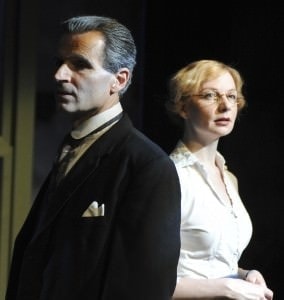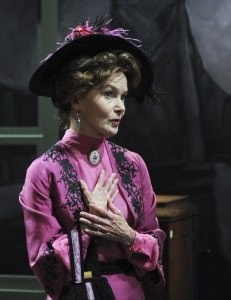In 1897, American writer Henry James got writer’s cramp and hired Theodora Bosanquet to take dictation on the newly invented typewriter in an arrangement that spanned the last eight years of his life.
These two literary figures are portrayed in the Washington premiere of Ghost-Writer, by well-regarded contemporary playwright Michael Hollinger. Like Hollinger’s six other plays, it was originally produced by the Arden Theatre Company in Philadelphia.

Ghost-Writer is set in a study with a window looking out on the Queensboro Bridge. The Henry James figure is named Franklin Woolsey. After Woolsey dies, his secretary, Myra Babbage, continues typing in his voice, causing a stir with the public. His wife, Vivian Woolsey, questions whether Myra is channeling her late husband’s words.
This action is only topical. There is a rich subtext that is conveyed by three experienced actors under the sure-handed direction of John Vreeke, whose simple placement of them the stage has an emotional meaning. Together they offer a brilliantly nuanced performance that leaves it up to the observer to draw his own conclusions, which makes it quite an engaging show.
Myra Babbage is played by Susan Lynskey, who has 90 percent of the dialog in the wonderful script. She addresses everything to the audience as if it collectively represents a muck-raking reporter who is looking for a salacious story about fakery, adultery, or both. But she also adopts the audience as a cozy confidant. She has laughing, intelligent eyes under arched eyebrows, one of which she lifts in irony to make a point with a subtlety that is nonetheless visible to all in the 130-seat theater.
Franklin Woolsey is played by Paul Morella. To the delight of the audience, he and Lynskey argue about a semi-colon early in the play.
“I’m not sure that’s what you want,” says Myra.
“I beg your pardon?” he asks.
“A semi-colon. After ‘proud, impervious eyes.’”
“Why not?”
“You must know that I would never contradict you were I not certain that your punctuation – carefully considered though it may be – will mar the phrase, and therefore the paragraph, chapter and book.”
The result is that he will say the words and she will add the punctuation, and so their relationship begins.
Morella portrays Woolsey with an eagle-like visage, unflappable but willing to bend to the influence of Myra. He often stands still or looks out the window at the bridge, thinking of what to write. If he can’t come up with something, he asks her to type a phrase, any phrase, to get him started.
Lynskey won’t divulge the phrase she types (it is unscripted), but whatever the words are, it becomes a musical refrain throughout the show. It is interesting to note that Hollinger was a violinist before he became a playwright.

Vivian Woolsey is played by Helen Hedman. I admire her elegant portrayal, not as a mistrustful wife, but as one who would expect her husband’s literary secretary to be a writer herself. She also portrayed Mrs. Woolsey as unapologetic of any pecuniary interest she might have in seeing Mr. Woolsey’s final manuscript published.
Jane Fink’s set design includes a backdrop painted with billowing fog that looks in a certain light like it is coming onto the stage. Robert Garner’s sound design features strands of music that fade in and out during some of Myra’s reminiscences. Alexander Keen’s lighting for the scenes with Myra and Mr. Woolsey has a nostalgic yellow cast. Ivania Stack’s costumes for Mrs. Woolsey include a light pink satin confection with a lavender over-jacket that drips with lace trim. Mrs. Woolsey’s piled hair made her look like a Gibson-girl. Myra’s hair is curled into a roll at the nape of her neck with stray wisps that suit a person whose mind is on more important matters
Said audience member Will Elwood, “Anyone who comes to see this should come twice because it is very Shakespearean with a lot of foreshadowing. This is the second time I’ve seen it and it thunderclapped me.”
I think I’ll see it again myself.
Running Time: 90 minutes, with no intermission.
Ghost-Writer plays through June 2, 2013 at MetroStage – 1201 North Royal Street, in Alexandria, VA. For tickets, call 1-800-494-TIXS (1-800-494-8497), or purchase them online.





